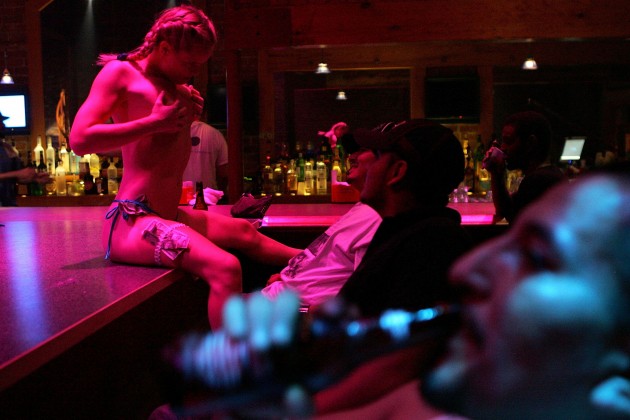An excerpt from “Wildcatting: A Stripper’s Guide to the Modern American Boomtown,” Susan Elizabeth Shepard’s excellent Buzzfeed long-form article about the sex industry that has attended the mad dash of money-hungry men to oil-rich Williston, North Dakota:
“The psychological principle of intermittent rewards explains the addictive appeal of gambling and Twitter. You might get a treat and you might not, and you never know, so you keep trying to see what happens next. It is the most American behavioral phenomenon.
Mineral extraction economies activate this neural mechanism: wildcatting, prospecting for gold — gambles that may pay off. Today it’s no longer the individual who makes these scores, of course, it’s corporations, but the work and opportunity draws those with nothing to lose but the trying. California in 1849, Colorado in 1859, Montana in 1883, Texas and Oklahoma in 1912, Alaska in 1970, North Dakota in 2008 — every time there’s a mining boom, it plays out thusly: Someone finds a valuable resource. People hear about it and flock to the area. These people are mainly men. The newly populated area is lawless and lacks the civilizing influence of family life. Among the first women to show up are prostitutes. For a while, everyone makes money and has fun. Or some people do, some gambles pay off. Then the resource dries up or its price drops, and the gamble isn’t profitable anymore, and the town eventually dries up or turns into a tourist attraction — or San Francisco, if it’s lucky. Because our brains are wired to want to continue taking that chance, everyone keeps gambling, no one thinks the boom will bust. It will. It always will.
Williston is booming right now. I’ve worked there since 2007, and oil has changed the town both completely and not at all. Whispers’ transition from typically tiny, haphazard small-town strip club into one trying to balance down home and big city is not working out too well, and it’s an example of the boom–bust cycle writ small. Capitalism’s inherent gamble plays out on a small stage with a chrome pole while lessons in second chances and knowing when to cut your losses are there to take to heart or ignore. It’s more America than anywhere I’ve been. Some oil workers think improvements in drilling and fracking technology will sustain the economy for decades, but that’s not my area of expertise. What I do know about is what it’s like to revisit a place you hate again and again over the span of six years, watch it change, and realize you’re watching history repeating and that you’re just another camp follower along the frontier, profiting from mineral extraction booms, chasing opportunity and running from stagnation.”

